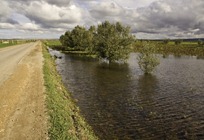Visonary County Commissioners in Kitsap, WA
cby Christopher Dunagan, KITSAP SUN, November 13, 201
 Water is too precious to use it for transporting sediments, wastes and pollution into Puget Sound, the Kitsap County commissioners said when they passed their “Water as a Resource” policy in June of 2009.
Water is too precious to use it for transporting sediments, wastes and pollution into Puget Sound, the Kitsap County commissioners said when they passed their “Water as a Resource” policy in June of 2009.
“Kitsap County’s four sewage treatment plants discharge over 1.5 billion gallons per year into Puget Sound,” the policy states in a section on sewage. “With additional treatment, this water could be used to reduce the dependence on groundwater and reduce pollution loading to Puget Sound.”
County Commissioner Charlotte Garrido said she would like to see water managed more like a natural system.
“Rain gardens” and porous pavement allow stormwater to soak into the ground, while septic systems produce clean effluent.
County Commissioner Steve Bauer said this new way of thinking about sewage and stormwater does not come easily to folks accustomed to operating large-scale sewer utilities.
“I really hope we can step back and look at this as a utility that might provide a support system for septics,” Bauer said.
Emerging technology may soon allow homeowners to install a small unit next to their septic tanks to treat effluent to essentially drinking water standards. This “wastewater” could then be used for watering lawns and gardens, perhaps even flushing toilets. Theoretically, if you can find uses for the water, then drainfields would not be needed — though such systems are not yet allowed under state regulations.
Instead of extending sewer lines everywhere throughout urban growth areas, high-tech systems could serve individual homes or new developments, Bauer said. Utility workers could maintain these smaller systems for a monthly fee, thus avoiding the high costs of upgrading treatment plants and running pipes everywhere. [Read rest of story]


